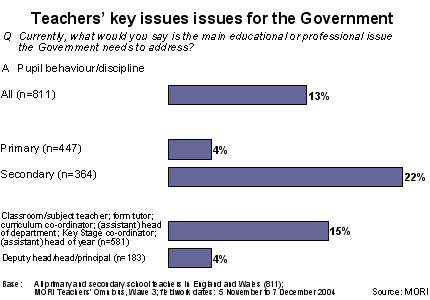Analysis Gives Clear Steer On Education Priorities
As the election approaches, new analysis by MORI Social Research Institute gives the political parties a clear steer on the education priorities of both teachers and of members of the public.
Teachers
The large-scale MORI Teachers' Omnibus survey reveals school funding (16%), workload (16%) and pupil behaviour (13%) to be the Top 3 spontaneously identified issues for education professionals. Teachers working in the secondary sector, and 'at the chalkface', are much more likely than primary school colleagues or more senior staff to highlight pupil behaviour as their predominant concern:

The public
Meanwhile, a MORI Omnibus survey of a representative cross-section of the general public in Great Britain also identifies pupil behaviour (17%) and school funding (9%) as key issues for attention by the Government. Other issues featuring in the public's Top 5 spontaneously-mentioned concerns are tuition fees (6%), class size (6%) and the need for higher minimum standards in young people's level of achievement (6%). With many calling for a "back to basics" approach, respondents' comments show them making an explicit link between what they see as a marked decline in standards of behaviour in British classrooms and the number of young people leaving school with poor (or no) basic literacy and numeracy skills (1).
MORI's General Election campaign polling (2) finds 61% of the public citing education as one of the issues they think will be very important in helping them to decide which party to vote for, second only to health (on 67%). The war in Iraq registers just 18% (Evening Standard Election Research -- Poll 1). Amongst those who see education as an important issue, Labour is seen as having the best policies on education (35%, compared with 20% for the Conservatives and 16% for the Liberal Democrats). However, all three parties have promised tougher measures to improve general levels of school discipline.
Notes
- In 2004, over 280,000 young people (two-fifths of those sitting it) did not gain a grade C or higher in GCSE English, while more than 350,000 young people (nearly half of those sitting it) did not gain a grade C or higher in GCSE Maths.
- For more details of MORI's 2005 Election Polling, see www.ipsos-mori.com/election2005
Technical details
- MORI interviewed a representative sample of 811 primary and secondary school teachers in England and Wales, by telephone, using the MORI Teachers' Omnibus. Fieldwork was conducted between 5 November and 7 December, 2004. Data were weighted at the analysis stage by age, gender, phase and GOR to match the known profile of teachers in England and Wales.
- Questions were placed on the MORI Omnibus, the regular MORI survey among the general public. A nationally representative quota sample of 2,048 adults (aged 15 and over) was interviewed throughout Great Britain by MORI in 191 different sampling points. Interviews were conducted face-to-face, in respondents' homes, using CAPI (Computer Assisted Personal Interviewing) between 6 and 11 January, 2005. At the analysis stage, data were weighted to reflect the known profile of the GB adult population.



